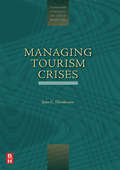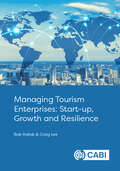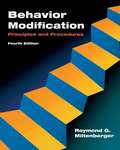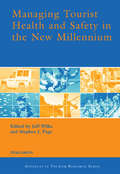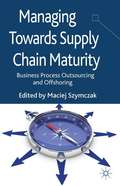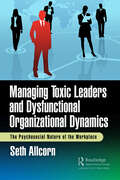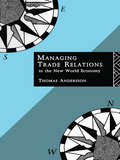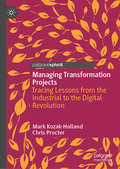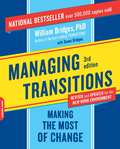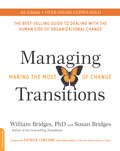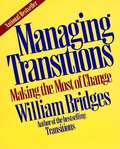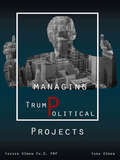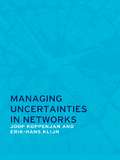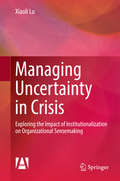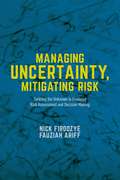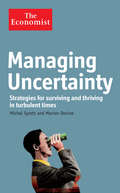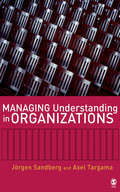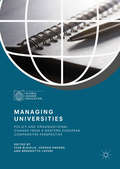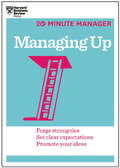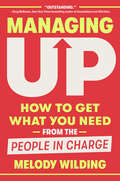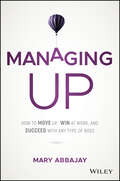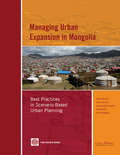- Table View
- List View
Managing Tourism Crises
by Joan C HendersonIn a world of increasing uncertainty it is vital that managers within the tourism industry are equipped with superior decision making skills and expertise necessary to deal with crisis conditions.Tourism Crises provides an effective synthesis of crisis management and tourism research with a solid theoretical foundation. It examines the principles and practices of crisis management within the context of tourism as a multi-sector industry. Using up to date international case studies, it tackles the following areas:· Political disturbance: the relationship between politics and tourism and political inspired tourism crises.· Social unrest: host-guest relations and tourists as targets of unrest· Economic instability: crises arising from fluctuating exchange rates and lack of investor confidence· Environmental conditions: natural disasters and health crises· Technological crises; transport accidents and crises arising from technical failure· Corporate crises. Human resource issues and questions of financeWith a user-friendly learning structure, each chapter will assess the presence of and tendency towards particular types of crisis, supported by a series of examples and cases, which describe organisational situations, challenges and responses. Approaches to managing crises will be assessed and appropriate tools and techniques of crisis management are explored, enabling readers to gain an insight into this critical aspect of tourism decision making and equipping them with the skills and expertise necessary to deal with crisis conditions.
Managing Tourism Enterprises: Start-up, Growth and Resilience
by Dr Rob Hallak Dr Craig LeeManaging Tourism Enterprises: Start-up, Growth and Resilience brings a new contribution to the literature on tourism management. It presents a comprehensive, educational text on the initiation, management, growth, performance and resilience of tourism enterprises in the age of digital disruption and global uncertainty. The book addresses the unique characteristics of tourism enterprises, how they are created, how they are managed, the factors that drive business performance, and how they must be innovative, resilient and adaptable in order to succeed. The content draws on empirical research, grey literature, government data and case studies to present theoretical and practical knowledge on the successful management of tourism enterprises and their role in tourism destinations. This book describes and includes essential business planning and teaching tools, such as: · The feasibility analysis, marketing plan, and strategic planning tools. · Lecture slides for each chapter. · Case studies with discussion questions. This is an essential book for undergraduate students completing 2nd and 3rd year courses on tourism management, with a focus on managing tourism enterprises; and postgraduate students undertaking courses specific to strategy and performance of tourism firms.
Managing Tourism and Hospitality Services: Theory and International Applications
by Gianna Moscardo Bruce Prideaux Eric LawsThe aim of this book is to enhance theoretical and practical understanding of quality management in tourism and hospitality. It provides a benchmark of current knowledge, and examines the range of research methods being applied to further develop tourism and hospitality service management research. It is hoped that this book will stimulate new research questions by highlighting tensions and challenges in the area.
Managing Tourist Health and Safety in the New Millennium (Advances In Tourism Research Ser.)
by Stephen J. Page Jeff WilksManaging Tourist Health is a seminal study which combines a range of state of the art reviews of the issues facing tourism managers and professionals in the fast growing area of tourist health and safety. An international range of contributors, each a specialist in their chosen field, have written papers for this book to explain many of the complex issues affecting tourists, the tourism industry and governments in ensuring tourism is viewed as a safe and enjoyable experience for all.The contributors have a wealth of interdisciplinary experience ranging from medicine, law, tourism research, safety science, ergonomics, management, consultancy among other cognate areas of study. Future research directions are examined in many of the chapters together with current state of the art knowledge in relation to key studies. The editors have worked in this area of research since the late 1980s and have accumulated a wide range of academic, professional and consultancy experience for governments and the private sector. The book extends this understanding through a multi-disciplinary perspective combining some of the leading researchers who have published in this area since the emergence of tourist health as a legitimate area of study in the 1970s.
Managing Towards Supply Chain Maturity
by Maciej SzymczakManaging Towards Supply Chain Maturity takes a view of the crucial issues involved in supply chain management, namely risk, information and social capital management. Over the last dozen or so years, the outsourcing and offshoring processes have grown in importance. It is now more and more the case that enterprises concentrate on their key competences while transferring operations or specific tasks to other countries. Modern supply chains are becoming supply networks; hence there is a need for conscious and concerted implementation of methods to manage risk, information and social capital. These issues are very important for the efficiency and competitiveness of supply chains and are discussed in detail. The discussion includes the results of research and introduces the concept of risk, information and social capital management that will ensure supply chain excellence and maturity according to the Poirier's model that has been taken as the point of reference for this study. From a managerial point of view this study can play a significant role in determining the best risk and information management practices in the context of the outsourcing and offshoring of business processes.
Managing Toxic Leaders and Dysfunctional Organizational Dynamics: The Psychosocial Nature of the Workplace
by Seth AllcornUnderstanding experience at work, especially in organizations that have toxic leaders and dysfunctional organizational dynamics, is a multidimensional undertaking that must include in-depth perspectives informed by psychosocial theory. This may be best accomplished by relying on complementary theories to account for what is found and experienced in our organizations and in particular a better understanding of why this is happening. "Why did she do that?" "Why did he say that?" "Why did a group react the way they did?" “Why,” is critical in terms of understanding organizational dynamics.Our lives at work in large complex and multidimensional organizations are saturated with experience, some of which is fulfilling, and some are of a darker nature that arises from the presence of toxic leaders and dysfunctional organizational dynamics. Understanding these toxicities and dysfunctions and their effect on organization members is approached by first raising their awareness at the beginning of the book before providing psychosocially informed insights that form a basis for understanding and organizational change in the following sections.This book explores these work-life dynamics by grounding them in concrete examples and then using complementary psychoanalytically informed perspectives to illuminate their underlying, often unconscious nature filling an important gap in management and organizational literature.
Managing Trade Relations in the New World Economy
by Thomas AnderssonManaging Trade Relations in the New World Economy analyses the implications of the new world economy for global trade. Thomas Andersson explores how manufactured exports have increased exponentially while the western economies have accrued massive current account deficits. Warning against the dangers of protectionism, he argues that the future of the world trading system, may depend upon the external policies of the EC.
Managing Transformation Projects: Tracing Lessons from the Industrial to the Digital Revolution
by Mark Kozak-Holland Chris ProcterThis book examines the management of three projects from the nineteenth century which led to substantial business transformation: the Stockton to Darlington Railway, the US Transcontinental Railroad and the Manchester Ship Canal. The lessons learned are of great relevance to contemporary project management, particularly those concerned with disruptive technology. The book addresses a wide range of project management topics associated with transformation. These include value management, sponsorship, governance, partnerships, opportunity management, project culture and morale, project complexity, uncertainty, prototyping and piloting, agility, innovation, risk and knowledge management.
Managing Transitions
by Susan Bridges WilliamFrom the most trusted voice on transition, a new edition of the classic guide to dealing with the human side of organizational change
Managing Transitions
by William Bridges Susan BridgesThe business world is transforming. Stories of layoffs, bankruptcy, mergers, and restructuring appear in the news every day. When these changes hit the workplace, the actual situational shifts are often not as difficult for employees and managers to work through as the psychological components that accompany them. Indeed, organizational transitions affect people; it is always people who have to embrace a new situation and carry out the corresponding change.The job of managing workplace change can be difficult; managed poorly, the result can be disastrous to the morale and stability of the staff. As veteran business consultant William Bridges explains, successful organizational change takes place when employees have a clear purpose, a plan for, and a part to play in their changing surroundings. Directed at managers on all rungs of the proverbial corporate ladder, this expanded edition of the classic bestseller provides practical, step-by-step strategies for minimizing the disruptions caused by workplace change. It is an invaluable managerial tool for navigating these tumultuous, uncertain times.
Managing Transitions in the Growing Enterprise
by Michael J. RobertsExplores the various transitions in approach and style that are required to cope with the challenges of growth.
Managing Transitions, 25th anniversary edition: Making the Most of Change
by William Bridges Susan BridgesThe business world is constantly transforming. When restructures, mergers, bankruptcies, and layoffs hit the workplace, employees and managers naturally find the resulting situational shifts to be challenging. But the psychological transitions that accompany them are even more stressful. Organizational transitions affect people; it is always people, rather than a company, who have to embrace a new situation and carry out the corresponding change. As veteran business consultant William Bridges explains, transition is successful when employees have a purpose, a plan, and a part to play. This indispensable guide is now updated to reflect the challenges of today's ever-changing, always-on, and globally connected workplaces. Directed at managers on all rungs of the corporate ladder, this expanded edition of the classic bestseller provides practical, step-by-step strategies for minimizing disruptions and navigating uncertain times.
Managing Transitions: Making the Most of Change
by William BridgesAimed at helping organizations understand change better and develop improved change strategies.
Managing TrumPolitical Projects
by Yara Osman Yasser OsmanCorrupt politicians and businessmen have been using construction projects to funnel money to secret projects since the first iron shovels broke ground. Yet today, throughout the world, there is little if any protection from it. In many countries, governments themselves don’t just ignore these affairs. They sponsor them. Individual project managers – hired to manage a project’s official goals – often find themselves in an impossible dilemma. Blow the whistle when no one will come to their aid, or try to manage the project as best they can while half their budget goes elsewhere. Following their first book, Buildings, Projects, and Babies, the authors – an experienced manager of international mega-projects and a talented architectural designer – offer their own unique solutions: help for project managers in identifying signs of corruption; new perspectives on the choices facing their colleagues in the management of such projects; and – more importantly – a call for establishment of a federal agency responsible for investigating and prosecuting corruption in national and international projects. While the global economy makes it difficult to stop corruption in much of the world, the authors believe the United States is still the last best hope for a solution. But given current trends in international business and governance, the time for solving this problem is short. And the time to act is now
Managing Uncertainties in Networks: Public Private Controversies
by Erik-Hans Klijn Joop KoppenjanAs public and private sector organizations work more frequently in partnership, managing uncertainties, problems and controversies becomes increasingly difficult. Despite sophisticated technology and knowledge, the strategic networks and games required to solve uncertainties becomes more complex and more important than ever before. This unique text examines such developments in the area of network strategy. Differentiating itself from other policy network approaches which mainly have a research focus, this text has a managerial orientation, presenting strategies and management recommendations for public and private sector organizations as well as the analytical tools required by practitioners seeking to support their own internal decision-making and strategy formulation. Tapping into the important and ever-growing area of risk and uncertainty management, this is a vital and long awaited staple for the arena, written by two leading authors in the field, and is key reading for students, scholars and policy makers seeking to understand the complexities of the network society.
Managing Uncertainty in Crisis
by Xiaoli LuThis book studies the variety of organizational strategies selected to cope with critical uncertainties during crises. This research formulates and applies an institutional sense-making model to explain the selection of strategies for coping with uncertainties during crises to answer the question why some organizations select a rule-based strategy to cope with uncertainties, whereas others pursue a more ad hoc-based strategy. It finds that the level of institutionalization does not affect strategy selection in the initial phase of responding to crises; that three rigidity effects can be identified in the selection of sense-making strategies once organizations have faced the failure of their selected strategies; that discontinuities in the feedback loop of sense-making do not necessarily move organizations to switch their sense-making strategies, but interact with institutionalization to contribute to switching sense-making strategies. This book bridges the gap between institutional thinking and crisis management theorizing. A major step forward in the world of crisis management studies! ----Professor Arjen Boin, Leiden University, the Netherlands In a world of increasingly complex, sociotechnical systems interacting in high-risk environments, Professor Lu's analysis of how organizations manage uncertainty is both timely and profound. ----Professor Louise K. Comfort, Director, Center for Disaster Management, University of Pittsburgh, USA Prof. Lu greatly enhances our understanding of how organizations cope with uncertainty and make sense of their challenges under the pressures of catastrophe. ----Dr. Arnold M. Howitt, Faculty Co-Director, Program on Crisis Leadership, Harvard Kennedy School, USA This book provides not only a theory of crisis management but also a key concept around which research and practice can be conducted. ----Professor Naim Kapucu, Director of School of Public Administration, University of Central Florida, USA A generic institutional model for analyzing and managing hazards, disasters and crises worldwide. ----Professor Joop Koppenjan, Erasmus University Rotterdam, the Netherlands This book has done an excellent job in opening the black box of how organizations make sense of the crisis situations they face and develop strategies to respond. It should be read by all of us who wish for a peaceful and safe world. ----Professor Lan Xue, Dean of School of Public Policy and Management, Tsinghua University, China
Managing Uncertainty, Mitigating Risk: Tackling the Unknown in Financial Risk Assessment and Decision Making (Global Financial Markets)
by Fauziah Ariff Nick FiroozyeManaging Uncertainty, Mitigating Risk proposes that financial risk management broaden its approach, maintaining quantification where possible, but incorporating uncertainty. The author shows that by using broad quantification techniques, and using reason as the guiding principle, practitioners can see a more holistic and complete picture.
Managing Uncertainty: Strategies for surviving and thriving in turbulent times (Economist Books)
by Michel SyrettManaging uncertainty has become a new business imperative. Technological discontinuities, regulatory upheavals, geopolitical shocks, abrupt shifts in consumer tastes or behavior, and many other factors have emerged or intensified in recent years and together conspire to undermine even the most carefully constructed business strategies. Managing Uncertainty: Strategies for Surviving and Thriving in Turbulent Times addresses these new challenges, assessing the sources of business turbulence, how to classify uncertainty, and the different ways in which uncertainty can be embraced to allow greater innovation and growth. Drawing on examples from around the world, the book presents the most recent ideas on what it means to manage uncertainty, from practitioners, academics, and consultants. * Addresses the challenges of managing uncertainty in business * Presents a step-by-step guide to managing business uncertainty * Draws examples from major international companies, including Intel, Procter & Gamble, Siemens, Boeing, Quinetiq, Philips, China Telecom, Ford, Apple, Shell, Glaxo SmithKline and many more Written for business leaders and managers looking for new ways to ensure that their businesses continue to thrive in a world of increasing complexity, Managing Uncertainty presents new and innovative ideas about reducing risk by understanding difficult-to-predict shifts.
Managing Understanding in Organizations
by Jorgen Sandberg Axel Targama′An excellent and much needed contribution to the management literature′ - Gareth Morgan ′Trough accurate examples and instructive accounts of what constitutes understanding at work, the Author leads us to the core link between understanding and managerial practicing. It is deeply informative, often witty and always elegant!′ - Silvia Gherardi Research Unit on Communication, Organizational Learning, and Aesthetics dipartimento di sociologia e ricerca sociale ′The book provides an interesting, accessible and important contribution to the interpretive understanding of management and leadership and clearly shows its relevance also for practitioners′ - Mats Alvesson Bringing a fresh perspective to the evaluation of management problems, this book draws upon interpretative research and builds upon existing interpretative studies to scrutinise the influence managers have on employees′ understanding. It considers how managers use ideas and visions to frame their employees′ internalised understanding of the external rules and instructions that govern their work. The book brings an interpretative perspective to the question of individual and group competence and look at how this is linked with understanding. Throughout Managing Understanding in Organizations refers to international case studies and considers the cross-cultural impact on management and understanding at work.
Managing Universities
by Benedetto Lepori Ivar Bleiklie Jürgen EndersThis book asks how modern universities are organized and managed, and questions whether 30 years of university reforms have resulted in stronger managerial structures and leadership control. It further asks whether current organisational and decision-making structures can be explained by public reform policies. The book offers a coherent, empirically grounded and theoretically driven presentation of data and core ideas behind a large scale comparative study of 26 universities across eight European countries. It focuses on the strength of university managerial structures, the role of academics, and how universities relate to and depend on their environment: to governments and other actors; to funders; to evaluators; and to external stakeholders. It further explores how higher education policies are shaped by and affect universities. Written by a cross-disciplinary team of European scholars, this book is unique both in its wide coverage and the depth of its analyses. It will be of great interest to scholars, graduate students and advanced undergraduates in the fields of organisation theory and sociology, policy studies, comparative public policy and administration, and higher education studies. It will also be of interest to higher education policy makers and administrators.
Managing Up (20-Minute Manager Series)
by Harvard Business ReviewYour boss plays an important role in your career. So how do you navigate this delicate, significant professional relationship without playing political games or compromising your character? Managing Up offers concise, expert tips on: Understanding your manager's priorities and pressures Setting a positive tone for the relationship Managing expectations-and egos Earning trust and respectAbout HBR's 20-Minute Manager Series:Don't have much time? Get up to speed fast on the most essential business skills with HBR's 20-Minute Manager series. Whether you need a crash course or a brief refresher, each book in the series is a concise, practical primer that will help you brush up on a key management topic.Advice you can quickly read and apply, for ambitious professionals and aspiring executives-from the most trusted source in business. Also available as an ebook.
Managing Up!: 59 Ways to Build a Career-Advancing Relationship With Your Boss
by Michael S. Dobson Deborah Singer Dobson<p>The key to moving up? Managing up! Whether you're seeking a surefire career-booster or simply looking to improve your relationship with your boss, this welcome guide gives you all the skills you need to build a productive, mutually beneficial relationship with your boss. Using the inspiring collection of ideas, strategies, and tactics found in <i>Managing Up!</i>, you'll learn how to: <p> <li>Enhance your relationship with your supervisor <li>Accurately read your boss's likes and dislikes <li>Provide the kind of support that helps your boss succeed <li>Make sure you're in tune with your boss's goals <li>Build mentoring and networking relationships throughout the organization <li>Handle criticism <li>Deal with problem bosses, and more.</li> </p>
Managing Up: How to Get What You Need from the People in Charge
by Melody WildingAn indispensable guide to navigating power dynamics, building effective relationships with higher-ups, and earning more authority, freedom, and confidence at work—from one of today&’s &“most innovative career coaches&” (Insider).&“Outstanding. Wilding's scripts and strategies show us a better way to get ahead at work.&”—Greg McKeown, New York Times bestselling author of Essentialism and Effortless Do you feel vulnerable to the whims of your boss, peers, or internal politics, pushing through each day with a nagging undercurrent of anxiety? Maybe you&’re micromanaged, interrupted in meetings, saddled with busy work, or overlooked for career opportunities. But what if you could subtly teach those above you to value your ideas and treat you with respect—without ever changing your job title?Human behavior professor and award-winning executive career coach Melody Wilding has helped thousands of clients advocate for their needs at work while navigating the minefield of office politics. In this clear, tactical guide, Wilding shows you how to operate from a position of power—even if you lack formal authority—to build the emotional intelligence, relational capital, and negotiation savvy to succeed in a world of competing stakeholders and remote work. Drawing on real-life client stories and the latest research on trust and persuasion, Managing Up distills a vital skillset into ten key conversations, including:• The Alignment Conversation: How can I get in my boss&’s head to understand their needs, motivations, and goals?• The Styles Conversation: Will I earn more respect from my manager if I get to the point quickly, or should I try swapping stories and building rapport? • The Boundaries Conversation: How do I say no and push back with tact when my manager saddles me with yet another task?Packed with time-tested strategies, detailed scripts, and transformative insights, this book is a must-read for professionals of all levels ready to reclaim control of their careers.
Managing Up: How to Move up, Win at Work, and Succeed with Any Type of Boss
by Mary AbbajayManaging Up is your guide to the most valuable 'soft skill' your career has ever seen. It's not about sucking up or brown-nosing; it's about figuring out who you are, who your boss is, and finding where you meet. It's about building real relationships with people who have influence over your career. Managing up is good for you, good for your boss, and good for the organization as a whole. <p><p> This book gives you strategies for developing these all-important connections and building more than rapport; you become able to quickly assess situations, and determine which actions will move you forward; you become your own talent manager, and your boss's top choice for that new opportunity. As a skill, managing up can do more for your career than simply 'networking' ever could—and this book shows you how. Real-world strategies give you a set of actionable steps, supplemented by expert advice from a top leadership consultant that helps you get on track to advancement. It's never too early or too late to start adjusting your alignment, and this book provides the help you need to start accelerating your trajectory. <p> Managing Up helps you build the sort of relationships that foster more communication, collaboration, cooperation, and understanding between people at different levels of power, with a variety of perspectives and skills. This type of bridge-building builds your reputation for effectiveness and fit, so you can start skipping rungs on the ladder as you build a strong, successful career. Managing Up is your personal manual for building this vital skill so you can begin building your best future.
Managing Urban Expansion in Mongolia: Best Practices in Scenario-based Urban Planning
by Tumentsogt Tsevegmid Yoonhee Kim Brett Sedgewick James ReichertThe sustainable development of "ger" areas in Ulaanbaatar, the capital of Mongolia, is one of the critical development issues facing Mongolia. The ger areas host 60% of the population of Ulaanbaatar, and they have expanded 35 times larger than the original center of the city. Provision of basic services (e.g. heating and water supply) is very limited or non-existent in ger areas. The lack of basic public services resulted in air and water pollution as well as serious health risks to residents. The government tries to control expansion of the city, particularly ger areas, but its policy practices have been inconsistent. These inconsistent actions are, in part, a result of limited awareness and understanding by the general public, as well as by the policy makers, of the public costs of their actions. There is high susceptibility to ad-hoc behaviors that place premiums on short-term private gains over long-term value-creation in public goods. Many supporting mechanisms, including land valuation and taxation, have not yet been developed to create incentives for long-term value creation. Mongolia: Enhancing Policies and Practices for Ger Area Development in Ulaanbaatar aims at helping policy makers and citizens of Ulaanbaatar to improve their understanding of the consequences of their choices of policies and practices. Specifically, it intends to provide clear cost and benefit implications of three different development paths (central, mid-tier, and fringe gers) for seven sectors (land and housing, water supply, roads and public transport, heating, electricity, solid waste, and social services). The report is a best practice in urban planning exercise which provides useful information that can apply for other big cities.
